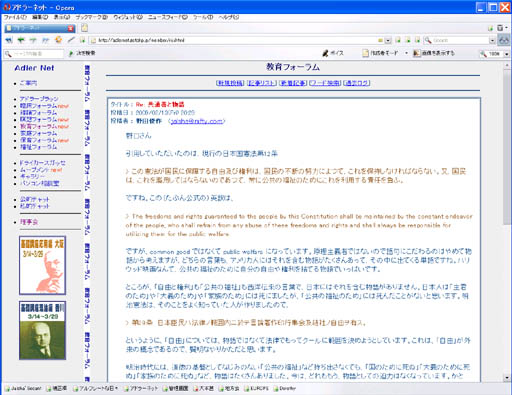
There is a bulletin board for Japanese Adlerians in the Internet. I wrote the following article there.
When we judge things, we choose something good, and do not choose something bad. If we do not have the common system of value, we must rely on the personal sense of each of us. The personal value of ordinary people often counts to live, to be rich and to be free for good, and to die, to be poor and to be restricted for bad. Adler called this value system Ichgebundenheit, self-boundedness. Where a society is constructed upon self-boundedness, there might be no common system of value. Accumulated egoism does not deserve to be called a value system; it should be called nihilism.
Friedrich Nietsche wrote in “Thus Spake Zarathustra” [1]:
“We have discovered happiness”- say the last men, and blink thereby. …One still loveth one’s neighbor and rubbeth against him; for one needeth warmth. …One still worketh, for work is a pastime. But one is careful lest the pastime should hurt one. …Who still wanteth to rule? Who still wanteth to obey? Both are too burdensome. No shepherd, and one herd!
Japanese politicians use slogans like “Respect Life” or “Peace and Prosperity” or “Freedom and Democracy”. Here, trying to provide people with the happiness of the last men, they are confessing that they themselves are nihilists. These words are nothing but the sophisticated paraphrases of to live, to be rich and to be free.
To overcome nihilism, we must die for something or somebody, or accept poverty, or abandon freedom. For whom, or for what, can we abandon our privileges?
Adler tried to overcome nihilism through the idea of Gemeinschaftsgefühl, Social Interest. He recommends us to abandon our privileges for the community. There is a tanka by Shuji Terayama, a modern poet:
I lit a match
and for a while the sea appeared
in a deep fog.
Do I have the motherland
to which I dedicate my life?
macchi suru
tsukanoma no umi ni
kiri hukashi
mi sutsuru hodo no
sokoku wa ari ya
Like this, the Japanese have deep fear to devote themselves to the community after the Greater East Asia War. Especially, patriotism is a forbidden word. It sounds like a phrase, “Die for the Emperor!” Social Interest has an association with patriotism, and, on some occasions, it is a very embarrassing idea for the Japanese.
Emmanuel Levinas, a Lithuanian-French Jewish philosopher, said [2]:
Without knowing how to swim, to jump into the water to save someone is to go toward the other totally, without holding back anything of oneself. To give oneself totally to the other to respond to his unspoken request, to the expression of his face, to his mortality, his “Thou shalt not kill.”
Levinas gives us another interpretation of Social Interest. The target of contribution is not the community, but the other who is in front of me and ask my help. “For whom, or for what, can we abandon our privileges?” I asked. Levinas answers, “For the other.” This idea is acceptable to the Japanese. We should contribute to the other who asks our help, even if he/she is a stranger to us. He quotes the following sentences from Vasily Grossman [3]:
The good is not in nature, and it is not in the preachings of the prophets, either, or in the great social doctrines, or in the ethics of the philosophers. But simple people bear in their hearts the love of all living thing; they love life naturally; they protect life. And a bit further he (Grossman) adds: “Thus there exists side by side with this so terrible greater good human kindness in everyday life. It is the kindness of an old lady who gives a piece of bread to a convict along the roadside. It is the kindness of a soldier who holds his canteen out to a wounded enemy. The kindness of youth taking pity on old age, the kindness of a peasant who hides an old Jew in his barn.”
[1] Friedrich Nietsche: Thus Spake Zarathustra, translated by Thomas Common. http://eserver.org/philosophy/nietzsche-zarathustra.txt
[2] Emmanuel Levinas: Alterity and Transcendence, translated by Michel B. Smith. Columbia University Press, New York, 1999, p.164.
[3] Emmanuel Levinas: Ibid., p.108.

